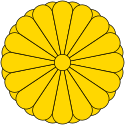Army-Navy Ministry
| Pre-modern Japan | |
|---|---|
 |
|
|
|
|
|
Chancellor / Chief Minister
|
Daijō-daijin |
| Minister of the Left | Sadaijin |
| Minister of the Right | Udaijin |
| Minister of the Center | Naidaijin |
| Major Counselor | Dainagon |
| Middle Counselor | Chūnagon |
| Minor Counselor | Shōnagon |
| Eight Ministries | |
| Center | Nakatsukasa-shō |
| Ceremonial | Shikibu-shō |
| Civil Administration | Jibu-shō |
| Popular Affairs | Minbu-shō |
| Military | Hyōbu-shō |
| Justice | Gyōbu-shō |
| Treasury | Ōkura-shō |
| Imperial Household | Kunai-shō |
|
|
|
The Ministry of the Military (兵部省 Hyōbu-shō), also known as Ministry of War and sometimes called Tsuwamono no Tsukasa, was a division of the eighth century Japanese government of the Imperial Court in Kyoto, instituted in the Asuka period and formalized during the Heian period. The Ministry was replaced in the Meiji period.
This part of the government bureaucracy has been variously identified as the Ministry of the Military and the Ministry of War.
The highest-ranking official or head of the military (兵部卿, Hyōbu-kyō) was ordinarily a son or a close relative of the Emperor. This important court officer was responsible for directing all military matters; and after the beginning in the late 12th century, this military man would have been empowered to work with the shogunate on the emperor's behalf.
The ambit of the Ministry's activities encompasses, for example:
The ministry was established as part of the Taika Reforms and Ritsuryō laws which were initiated in the Asuka period and formalized during the Heian period. After 702, the Hyōbu-shō replaced the Hyōseikan, which was created in 683.
In the Edo period, titles associated with the ministry became ceremonial titles.
In the Meiji period, the hyōbu-shō was reorganized into a modern Ministry of War and Ministry of the Navy.
The Asuka-, Nara- and Heian-period Imperial court hierarchy encompassed a ministry dealing with military affairs.
In the 18th century, the top ritsuryō officials within this ministry structure were:
...
Wikipedia
